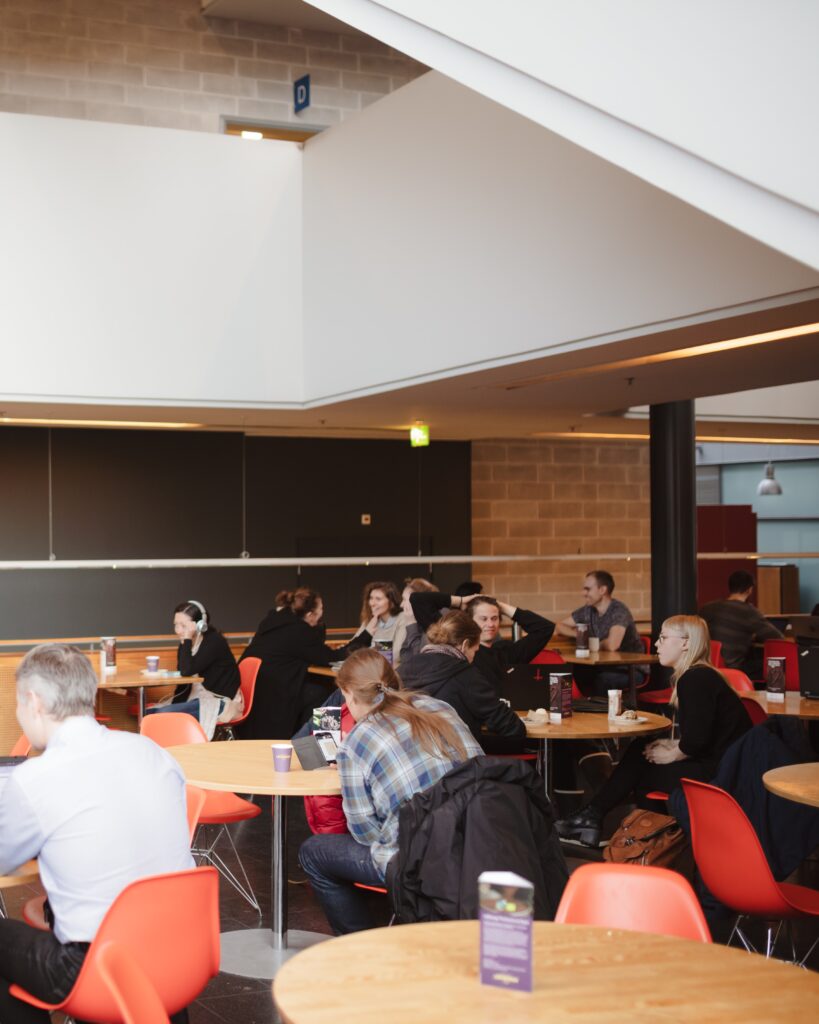


Student Representative’s Glossary for Steering Groups
BLOG
What did the teaching schedule mean again? What or who is the dean? After the autumn’s calls for applications for student representatives opened, you might have encountered quite a few new or otherwise ambiguous words. The aim of this glossary is to help everyone understand the most important terms in University administration!
Administrative bodies and units
Academic Affairs Council (ONE)
The Academic Affairs Council is an administrative body led by the vice rector in charge of academic affairs. It brings together the vice deans in charge of teaching at faculties and experts in academic administration. Students are represented on the council by HYY’s specialist in educational policy and one student representative. The Academic Affairs Council is a crucial place for advocacy work, as most of those rector’s and vice rector’s decisions related to teaching and policies on processes for developing teaching that concern the entire University are prepared in the council.
Faculty
The University has 11 faculties, which have authority over their own finances and teaching within the limits set by the Board and the rector. Each faculty has a faculty council, which has student representation. The faculties decide on their division into departments or other smaller units themselves. The Swedish School of Social Science is a separate unit that corresponds to the faculties and also has student representation on its board.
Faculty Council
The faculty councils are the highest decision-making bodies in faculties, and they are led by the deans. They develop the faculty’s operations based on goals set by the faculty itself as well as the University. Their duties include selecting the dean, deciding on the faculty’s budgets and implementation plans as well as the curricula prepared by the steering groups of degree programmes. They also issue the faculty’s official statements on developing the University. The size of the faculty councils varies, but they always have tripartite representation and either three or five student representatives along with their vice members.
Department
Some faculties are divided into smaller operating units, which are usually called departments. In many faculties, the personnel structure and supervisory relationships are based on departmental divisions. Departments and other smaller units in the faculties do not have their own budgets, nor do they have students under their direction. Instead, they use funds within the limits set by the faculty council, whereas students always belong to degree programmes.
Degree Programme
All students study in degree programmes, most of which are divided into study tracks. Each bachelor’s, master’s and doctoral programme has a director and an steering group with student representatives to develop teaching in the degree programme. Degree programmes can belong to one faculty or be shared by several faculties. However, all degree programmes have one faculty that is named in charge of them – administratively, the degree programme belongs to this faculty.
Study Track
Students belong not only to degree programmes, but in most degree programmes also to more specialised study tracks. Specialisation into study tracks takes place either right at the beginning of studies or at a later point during them.
Steering Group
Degree programmes have steering groups that are appointed by the dean and include two student representatives and their vice members. The steering groups make proposals on curricula that are in effect for several years as well as decide on the annual teaching schedule – this makes it the most important administrative body from the perspective of everyday studies.
The steering groups of degree programmes may sometimes be called executive groups as a direct translation from Finnish. The terms ‘steering group’ or ’executive group’ can also refer to other groups than the steering groups of degree programmes – for instance, the executive or management group of the University, which includes the rectors, the director of administration, the directors of different sectors and one dean from each campus; the executive group of a faculty; or the executive group of doctoral education within the entire University, for which the student representatives are chosen by the University of Helsinki PhD Students.
People of the University of Helsinki
Dean
Director of the faculty appointed by the faculty council from among the professors in the faculty. The dean is in charge of the faculty’s operations and finances to the extent that the duties have not been assigned to the faculty council or some other administrative body by the University Statutes, the Rector’s decisions or some other regulations. The dean is appointed for a term of five years at a time at the most.
Vice dean
Faculties have one or more vice deans, according to the dean’s decision. The vice deans act in their own areas of responsibility in the faculty and as representatives of the faculty in society and the University’s various councils: the vice dean in charge of teaching in the Academic Affairs Council, the vice dean in charge of research in the Scientific Council, the vice dean in charge of societal interaction in the Societal Interaction Council and the vice dean in charge of international affairs in the Internationalisation Council.
Head of academic affairs
Each faculty has a designated head of academic affairs in charge of directing the faculty’s study administration. The heads of academic affairs are also in charge of matters related to students’ legal protection.
Documents and concepts related to University administration
Universities Act
The Universities Act provides regulations on the Finnish universities, their duties and the self-governance, or autonomy, of universities. Universities’ operations must adhere to the Universities Act as well as certain decrees issued by the government and the Ministry of Education and Culture. In addition to this, universities are governed by legislation such as the Non-Discrimination Act, the Equality Act and the Act on the Openness of Government Activities.
Tripartite principle
The University’s administrative bodies generally have representatives from three groups that belong to the University community and are defined in the Universities Act (Section 15): 1) professors, 2) the ‘middle group’, or other teaching and research personnel as well as other personnel, which consists primarily of the personnel of University Services, and 3) students. This division is referred to as the tripartite system, and bodies based on this kind of representation of the University community follow the tripartite principle.
When all groups of the University community have the same number of representatives in an administrative body, we have what is known as the tripartite system with equal representation. This is not the case at the University of Helsinki – professors are in the majority in the administrative bodies that follow the tripartite system. HYY’s goal is to get the tripartite system with equal representation adopted at the University of Helsinki, too.
University Regulations or University Statutes
University Regulations, also translated as the Statutes of the University of Helsinki, define how the University operates: its administrative structure, the duties of different directors and administrative bodies, the required qualifications for different positions, the status of the Swedish language at the University and much more. In addition to the highest statute, the most important document guiding the University’s operations from a student perspective is the Regulations on Degrees and the Protection of Students’ Rights at the University of Helsinki, which student representatives should definitely get acquainted with. The Board decides on the University Statutes, and when the statutes are being renewed, extensive comment rounds are held for faculty councils, for instance.
Rector’s and other directors’ decisions
In addition to the University Statutes, the University’s operations are guided by individual decisions. The decisions made by the rectors and certain other university-level directors are also available for everyone to read. As a student or student representative, you can appeal to these decisions if, for instance, a teacher decides to organise teaching during the afternoon of the opening day of the academic year – and in several more important issues, as well. In faculties, these decisions are made by the dean, among others, whereas in independent institutes, they are made by the institutes’ directors.
Teaching Schedule
The steering groups of degree programmes annually decide on the teaching schedule for the next academic year. The teaching schedule determines the study units offered during the academic year, including their time, methods of completion and supervising teachers.
Curriculum
The curriculum of a degree programme or, for instance, the Language Centre, is a three-year plan that sets out matters such as the programme’s degree structure and the study modules and individual study units it includes along with their learning objectives and evaluation methods. The faculty councils decide on the curricula, but the best way to influence them as a student representative is through the steering groups of degree programmes, which prepare the curricula for the faculty councils. The curriculum can also be referred to as the ‘degree requirements’ or ‘degree structure’.
Transition Period
When curricula change, a transition period that usually lasts the duration of one curriculum period (3 years) begins. During this period, it is still possible to study and graduate according to the requirements of the previous curriculum.
Transition Rules
When you move from an old curriculum to a new one, the courses you have already completed that adhere to the old curriculum can be used to replace the courses that adhere to the new curriculum according to certain transition rules. The transition rules are always approved in connection with the new curriculum, which means that they are prepared in the steering groups of degree programmes and decided by the faculty councils.
Is the list still missing a term you have encountered and do not understand? Do not hesitate to send us a message and we will add your word to the glossary!
The call for applications for student representatives to the Steering Groups of the Degree Programmes is open until 16 October. Read more about serving as a student representative and the selection of student representatives at hyy.fi/representative.
Further information:
Selection Coordinator Timo Kalliokoski
Tel. 050 477 5561, timo.kalliokoski@hyy.fi
Specialist in Educational Policy Marianna Suokas
Tel. 050 325 5202, marianna.suokas@hyy.fi



